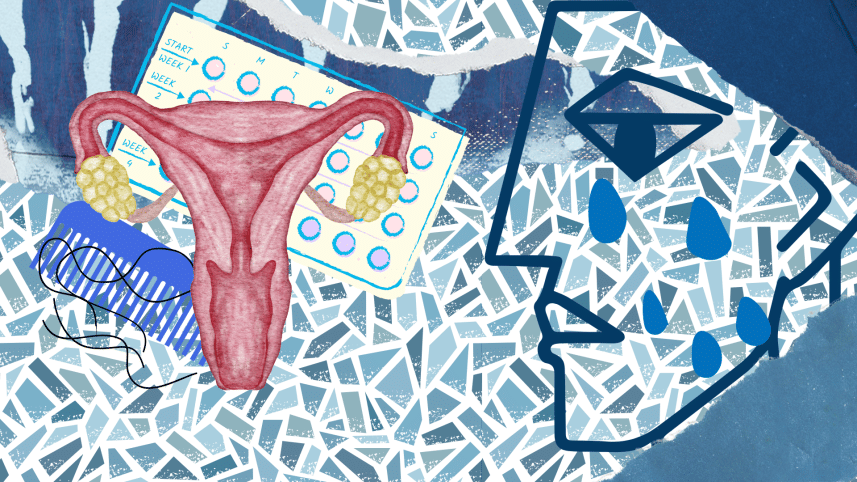Menstrual pain management and the lack of targeted therapy in Bangladesh

Due to the wide range of experiences among menstruating individuals, the term "menstruation", which generally refers to the monthly release of blood through the vagina, remains mysterious. Blood discharge is one of its components, but there are many more that we rarely discuss. Among the many is the management of menstrual pain.
It's not uncommon to see people be unaware of menstrual pain simply because they do not experience it, and that leads to overgeneralisation. It could even affect the judgement of those who shape the minds of young people.
"I got my period quite early, and I was scared to ask many questions. I remember crying to my mother as to why this was happening to me; she laughed and said it would be alright. I never experienced excruciating pain, and when my Science teacher in class nine said how menstrual pain is psychological, I agreed with her, not knowing any better," said Fatema Tuz Zohra, a final-year student at Chittagong University.
According to a paper published by the Centre for Economic Studies and Ifo Institute (CESifo), titled "Social Norms and Misinformation: Experimental Evidence on Learning about Menstrual Health Management in Rural Bangladesh", the majority of menstruating people report decreased physical and mental well-being, particularly stress and shame, during menstruation. Additionally, there are significant knowledge gaps regarding the proper use of hygienic materials for menstrual health management, and empirical and normative expectations align with the reported adverse health behaviours. The shame surrounding menstruation is one of the key reasons for the dearth of discussions about menstruation and, more specifically, menstrual pain.
Zohra further added, "It was not until my early 20s that I learned about endometriosis and other issues that lead to intense menstrual pain. With the shame surrounding menstruation, I thought it'd be better if I didn't draw much attention to it. I never thought that simply not knowing about these issues was causing me to invalidate other people's experiences."
Because of the lack of awareness, targeted therapy is often rare. Menstruating people often think their symptoms are not alarming and that everyone experiences the same symptoms, which is not true. Even if we look at the statistics by the World Health Organisation (WHO), endometriosis affects roughly 10 percent (approximately 190 million) of reproductive-age people globally.
Merely prescribing medication to alleviate menstrual pain is insufficient for addressing all issues; healthcare professionals must provide adequate explanations to enable patients to fully understand their current situation and make educated decisions. Alo Akter, who has been suffering from severe menstrual pain due to endometriosis for more than two years, states, "I used to feel intense pain during my periods, but the worst menstrual pain I endured was when I couldn't even sit at home and do online classes. Then, I went to the doctor, and the ultrasound showed a cyst on my ovary. The doctor told me that I should stop my period by taking pills and told me to get married in a few months, but when I asked if my problem would go away afterward, he could not give me the answer."
There were a few complaints from one of the interviewees who wished to remain anonymous. She suffers from vaginismus, which causes vaginal muscles to involuntarily or persistently contract. She says, "I didn't even know what vaginismus was. I contacted my gynaecologist because I wanted to use tampons but couldn't because of the pain. She prescribed me pills. What will that do? Pills won't help the pain."
Upon talking with a few others, a pattern was noticed: whenever a patient complained regarding pain, the doctors often prescribed birth-control pills.
Pills are effective when it comes to regulating your cycles and managing pain to some extent, but they are not for all conditions. Besides, pills are not for everyone. According to another paper titled "Adverse Effect of Combined Oral Contraceptive Pills" published in the Asian Journal of Pharmaceutical and Clinical Research, because of using pills, people of reproductive age experience side effects such as spotting, weight gain or weight loss, nausea, breast tenderness, severe headache, depression, darkening skin, and vaginal infection. The adverse effects might make daily tasks a nuisance.
A lack of understanding and knowledge among parents lead to a reluctance to take pain medication and targeted therapy. Dr Shamima Aktar, gynaecology and obstetrics consultant at Prabin Hospital (BAAIGM), says, "There's a lack of targeted therapy for menstrual pain because parents seldom discuss the manifold aspects of menstrual cycles and patterns. I have patients who complain of severe pain during their menstruation but never take pain medication because their parents deem medications to be redundant or that their children might become heavily reliant on them. Some guardians take active measures when they realise their children are having severe pain during menstruation, but most parents usually lack knowledge and awareness, hence the lack of targeted therapy."
The management of menstrual pain in Bangladesh is hindered by a lack of targeted therapy and knowledge. The prevalent use of a one-size-fits-all approach, particularly the indiscriminate prescribing of birth control pills, fails to address the diverse and individual experiences of those who menstruate. This approach often overlooks the unique needs of individuals suffering from conditions such as endometriosis, polycystic ovary syndrome (PCOS), vaginismus, etc., leading to inadequate treatment and continued suffering.
The deep-rooted shame and stigma surrounding menstruation contribute significantly to the lack of open discussions and awareness, further perpetuating the issue. To address the situation, parents and educators must create a more informed and encouraging atmosphere for young people, and healthcare experts must provide individualised care and thorough explanations. For Bangladesh's menstrual population to maintain their physical and emotional health, these gaps must be filled.
As though pain were merely a personal flaw, every cramp, spasm, and blood heaviness are felt in private, stitched into women's existence. Families hush it, teachers dismiss it, and doctors often reduce it into a prescription. But pain that is unnamed grows heavier; it presses into the mind until it feels like shame. To speak of it openly is still seen as transgressive, to demand answers is to risk being told it is all in your head. Yet, if half the population must bleed in order to exist, why must their suffering remain unacknowledged? Why must they be taught to live as though their pain were not real?
References:
1. Social Science Research Network. (2021). Social Norms and Misinformation: Experimental evidence on learning about menstrual health management in rural Bangladesh.
2. Asian Journal of Pharmaceutical and Clinical Research. (2016). ADVERSE EFFECT OF COMBINED ORAL CONTRACEPTIVE PILLS.
3. World Health Organization: WHO & World Health Organization: WHO. (March 24, 2023). Endometriosis.
Azra Humayra is a Sub-Editor at Campus, Rising Stars, and Star Youth.



 For all latest news, follow The Daily Star's Google News channel.
For all latest news, follow The Daily Star's Google News channel. 
Comments